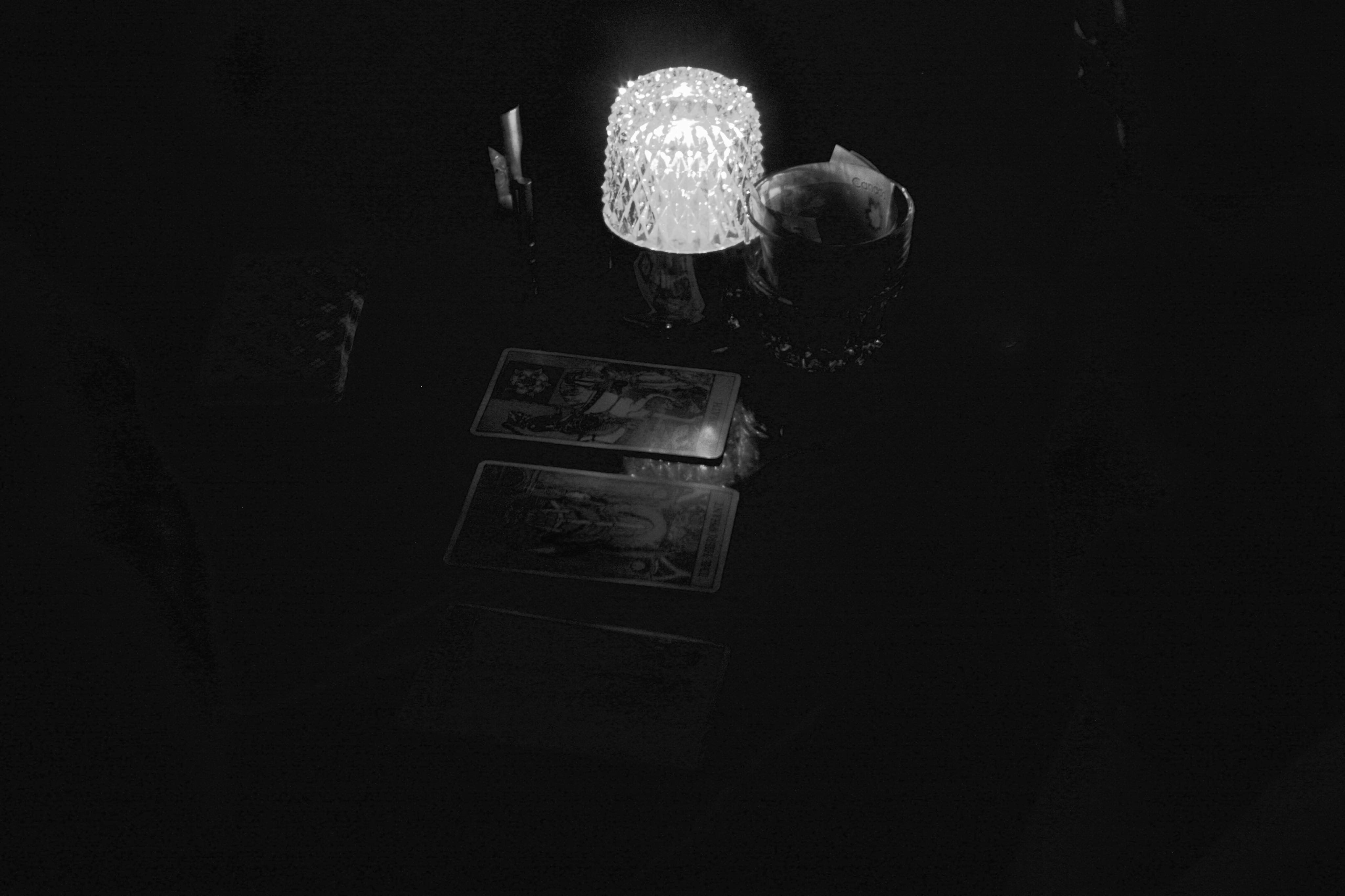Bar Datcha switches vibes with jazz and tarot every Thursday
Walking through the doors of Bar Kabinet on Laurier Ave. W., adjacent is Bar Datcha. The warm yellow light in the entrance dances off the walls and drink glasses at the bar, creating a magical atmosphere. Patrons sit drinking and chatting with the bartenders, while a low hum of jazz music emanates from within the walls.
To the right of the bar, black curtains lead the way to the main event: a jazz band performance, and tarot card reading. Opposite to the entrance, the room has pitch-black walls with dim lighting and cloud-like smoke, setting an “1830s Parisian opium bar” vibe.
At the table across from the band sits Samuel Bonneau Varfalvy, organizer and tarot reader, waiting for his next client. He’s lively and interactive, making it feel like those who speak with him already know him. Varfalvy is an artist, manager and musician, who also teaches music. With his partner, Isaac Larose, a nightclub promoter, he brought to life the idea of jazz and tarot in a nightclub. “This whole [tarot reading] thing started a couple of years ago,” said Varfalvy. “I became a little obsessed with tarot after reading about it and learning.”
“He went crazy and started bringing his taxi drivers in the apartment for readings,” Larose said with a laugh. “We’re roommates and I was just like ‘that’s not okay.’ My girlfriend then suggested we look for somewhere to do this in.”
The duo started the concept of jazz and tarot last year, at The Emerald on Park Ave. That only lasted about five months partly due to, according to Valvarfy, misconceptions about the nature of tarot. “There’s a very strong Jewish community [there], and a lot of Hasidic people associate tarot with dark magic and witchcraft,” Valfarvy said. “They thought I was a sorcerer or something.” He shrugged his shoulders and smiled.
After the Emerald, the pair found Bar Datcha and thought it was the exact embodiment of their vision. “I think a lot of people would not necessarily go see a tarot reader,” said Larose. “If you put it in a different context where it’s really easy to just try it, people might end up liking it.” The aim of this unusual pairing was also to encourage people who would perhaps not go on their own to have a fun and unorthodox experience.
As for choosing Datcha, Larose, who has worked with other clubs such as Tokyo Bar, wanted to take the already popular vibe and see what else could be added to it. “We wanted this little bar where there’s tarot, and we feel like we’re in an opium bar in 1830s Paris,” said Varfalvy. “And Isaac said, ‘Oh we should add in some jazz,’ and we were like ‘Let’s call it Jazz and Tarot.’”
Varfalvy’s main influence in the world of tarot reading is Alejandro Jodorowsky, a mystic, healer and cult filmmaker who has studied tarot reading in depth. “He’s a psychedelic movie director,” Varfalvy said with a smile. “[Jodorowsky] found the old Tarot de Marseilles from the 16th century, technically the original cards, and he reprinted [them] using this old tarot card printer in France.”
To Varfalvy, tarot is a performance art in a way. “There’s nothing magical or mystical about tarot to me,” said Varfalvy. “It was a sort of card game, and for some reason, people started using them for like 16th century psychology.”
Varfalvy has a methodology he follows when reading cards. His technique revolves around two foundations. The first is accepting that it is not magic, but psychology. The second is accepting that the future cannot be known, simply anticipated. “The cards point to a relationship with the future that you have,” said Varfalvy. “It’s one of two things: you either desire it or fear it.”
Varfalvy gives the deck of cards to his client and asks them to think of a question while shuffling it—for orientation and direction. He then takes the cards and spreads them in a semicircle on the table, and asks the client to pick three cards out of the pool. According to him, the first one to his right is past, the middle is present, and the last one is future.
“I’ve never done tarot reading before, so there was some apprehension and skepticism going in,” said Cameron Begin, an event attendee. “My friend told me to try it for experience, and often there are people who are good at connecting. Immediately, I felt that I connected to Sam, and kind of surrendered to him and what he had to say. As the cards began to fall and he read them, it felt like he did have a strong intuition. It gave me food for thought.”
At 11:30 p.m., Datcha switches to techno and becomes a full-blown nightclub. In the meantime, Varfalvy continues doing readings for those Larose brings him.
“Bring me my next victim,” Varfalvy said with a laugh, welcoming the next person to the chair across from him.
Bar Datcha (98 Laurier Ave. W.) hosts Jazz and Tarot nights every Thursday.
Feature image by Fatima Dia.
